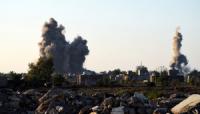-
Assault weapons not protected by Second Amendment: U.S. appeals court

The U.S. Court of Appeals for the Fourth circuit ruled 10-4 to uphold Maryland’s ban on assault weapons, ruling that assault weapons are not protected under the Second Amendment of the U.S. Constitution. “Put simply, we have no power to extend Second Amendment protection to the weapons of war,” Judge Robert King wrote. “Both before and after Newtown, similar military-style rifles and detachable magazines have been used to perpetrate mass shootings in places whose names have become synonymous with the slaughters that occurred there,” he wrote.
-
-
Loss of territory contributes to significant drop in ISIS funding

Islamic State’s income has more than halved since 2014, due to its shrinking territory in Syria and Iraq and subsequent losses of significant sources of revenue, according to a new study. Whilst it is impossible to say exactly how much money Islamic State has at its disposal, findings show that the most significant sources of revenue are closely tied to the territory it controls. Most recent evidence suggests that total income from taxes/extortion, oil, kidnapping, antiquities, looting, and confiscations has decreased from up to $2 billion in 2014 to less than $800 million in 2016. There is also no evidence that the group has been successful in creating new sources of revenue.
-
-
How governments and companies can prevent the next insider attack
Insider threats could take many forms, such as the next Edward Snowden, who leaked hundreds of thousands of secret documents to the press, or the next Nidal Hasan, the Fort Hood mass killer. Indeed, in today’s high-tech and hyperconnected world, threats from insiders go far beyond leakers and lone-wolf shooters. A single insider might be able to help adversaries steal nuclear material that terrorists could use to make a crude nuclear bomb, install malware that could compromise millions of accounts or sabotage a toxic chemical facility to cause thousands of deaths. How can we better protect against the enemy within, no matter what it is that needs to be protected? In our high-tech society, the insider threat is ever-present. High-security organizations, governments and companies alike need to take action to counter the organizational and cognitive biases that often blind us to the insider danger – or future blunders will condemn us to more disasters.
-
-
Preferential trade agreements bolster global trade at the expense of its resilience
The global commodity trade is a complex system where its network structure, which may arise from bilateral and multilateral agreements, affects its growth and resilience. At time of economic shocks, redundancy in this system is vital to the resilience of growth.
-
-
Terrorists could kill 30 million people within a year using bioweapons: Bill Gates
Bill Gates, in a speech at the Munich Security Conference, compared the dangers to nuclear war and bioterrorism. “The next epidemic could originate on the computer screen of a terrorist intent on using genetic engineering to create a synthetic version of the smallpox virus, or a super contagious and deadly strain of the flu,” he said. “Whether it occurs by a quirk of nature or at the hand of a terrorist, epidemiologists say a fast-moving airborne pathogen could kill more than thirty million people in less than a year.”
-
-
Lebanese media: Hezbollah given “game-changing” Iranian arms, has tunnels on Israeli border
Iran has sent “game-changing” weapons to its proxy group Hezbollah, which has been actively building tunnels and fortifications along Lebanon’s border with Israel, a knowledgeable observer said. “Israel reads the map and realizes that Hizbullah’s weapons arsenal has steadily grown, and is now several times larger than it was in 2006, and that the kind of weapons that the enemy tried and is still trying to prevent the resistance from acquiring – namely, what Israel calls ‘game-changing’ weapons – is available to it in great amounts,” he added.
-
-
Russia, Trump and the 2016 election: What’s the best way for Congress to investigate?

Exactly how will the U.S. conduct a fair and accurate investigation into Russian meddling in the 2016 election and links with President Donald Trump’s campaign? U.S. congressional leaders are discussing options. At a time when Congress is sharply polarized along partisan lines, congressional investigations tend to become microcosms of that polarization. This is all the more true when an investigation involves an issue about which the president is vulnerable to political embarrassment or attack. If the intelligence committee proves unable to conduct a thorough and bipartisan investigation of Russian meddling and Trump’s campaign, pressure will build on America’s leaders to establish a more independent probe. Hanging in the balance could be whether the United States can forge consensus about what happened and how to prevent it from happening again.
-
-
U.S. intelligence: a “truth-devoted” culture
Rolf Mowatt-Larssen, now a senior fellow at the Belfer Center for Science and International Affairs, was director of intelligence and counterintelligence at the U.S. Department of Energy and was a decorated CIA intelligence officer. He discusses the nature of intelligence work, the belief structure that drives those who do it, the probe of Russian interference in the election, and the friction between the Trump administration and the intelligence agencies.
-
-
January 2017 terrorism: The numbers

The House Homeland Security Committee has released its February 2017 Terror Threat Snapshot, which details terrorism events and trends in January 2017. The snapshot is a monthly committee assessment of the threat America, the West, and the world face from ISIS and other Islamist terrorists. The document is produced by the Majority Staff of the committee. It is based on information culled from open source materials, including media reports, publicly available government statements, and nongovernmental assessments.
-
-
Venezuelan vice-president is a major drug trafficker, with terrorism ties: U.S.
The Trump administration on Monday announced it had imposed sanctions on Venezuela’s vice-president, Tareck El Aissami, charging that he was a major drug trafficker. El Aissami is the most senior Venezuelan official – and one of the most senior Latin American official — to have been charged of drug offenses by the United States. El Aissami has caught the eye of U.S. law enforcement years ago, when, as interior minister in the government of Hugi Chavez, he ordered his underlings to issue dozens of fraudulent Venezuelan passports to people from the Middle East, including members of Hezbollah.
-
-
Hate groups increase for second consecutive year, while Patriot groups decline
The number of hate groups in the United States rose for a second year in a row in 2016, according to the SPLC annual census of hate groups and other extremist organizations, released yesterday. The most dramatic growth was the near-tripling of anti-Muslim hate groups — from 34 in 2015 to 101 last year. Figures compiled by the FBI dovetail with those of the SPLC – and the latest FBI statistics show that hate crimes against Muslims grew by 67 percent in 2015, the year in which Trump launched his campaign. In contrast to the growth of hate groups, antigovernment “Patriot” groups saw a 38 percent decline — plummeting from 998 groups in 2015 to 623 last year.
-
-
UN warns Lebanon against arming Hezbollah
The United Nations warned Lebanese President Michel Aoun against arming Hezbollah, a day after Aoun said that the Iran-backed terrorist organization was essential to Lebanon’s security. UN Council Resolution 1701, which was adopted unanimously to end the 2006 war between Israel and Hezbollah, called for the disarming of all militias in Lebanon and the re-establishment of the Lebanese government’s authority over the southern part of the country, and prohibited the transfer of arms to any entity other than the government in Lebanon. Hezbollah’s continued armed presence in southern Lebanon violates these three elements of the resolution.
-
-
Russia violates landmark arms-control treaty by secretly deploying banned cruise missile

The Trump administration may be facing its first challenge from Russia as news emerged that Russia had secretly deployed a new cruise missile. The development and deployment of the cruise missile violates a landmark arms control treaty, signed in 1987 – the Intermediate-Range Nuclear Forces Treaty (INF Treaty) — which prohibited the development and deployment by the United States and Russia of land-based intermediate-range missiles.
-
-
Former Iranian hostage asks feds to seize New York skyscraper to pay for damages
A former hostage of the Iran-backed terror group Hezbollah has asked the federal government to seize a New York City skyscraper that he alleges is a front for the Iranian government in order to collect on his multi-million dollar court judgment against the Islamic Republic.
-
-
Michael Flynn's top aide fired from NSC after security clearance is denied
A top aide to Michael Flynn, President Donald Trump’s national security advisor, was on Friday fired from his position as senior director for Africa at the National Security Council (NSC) after the CIA rejected his application for a high-level security clearance. Flynn himself is in hot water for misleading Vice President Mike Pence about discussions he — Flynn — had with Russian ambassador Sergey Kislyak on 29 December, in which he told the Russian ambassador not to worry about the sanctions the Obama administration had imposed on Russia that same day for its cyber-meddling in the presidential election, because Trump, after being sworn in, would lift these sanctions – as well as the sanctions imposed on Russia for annexing Crimea and invading Ukraine.
-
More headlines
The long view
Kinetic Operations Bring Authoritarian Violence to Democratic Streets
Foreign interference in democracies has a multifaceted toolkit. In addition to information manipulation, the tactical tools authoritarian actors use to undermine democracy include cyber operations, economic coercion, malign finance, and civil society subversion.
Patriots’ Day: How Far-Right Groups Hijack History and Patriotic Symbols to Advance Their Cause, According to an Expert on Extremism
Extremist groups have attempted to change the meaning of freedom and liberty embedded in Patriots’ Day — a commemoration of the battles of Lexington and Concord – to serve their far-right rhetoric, recruitment, and radicalization. Understanding how patriotic symbols can be exploited offers important insights into how historical narratives may be manipulated, potentially leading to harmful consequences in American society.
Trump Aims to Shut Down State Climate Policies
President Donald Trump has launched an all-out legal attack on states’ authority to set climate change policy. Climate-focused state leaders say his administration has no legal basis to unravel their efforts.
Vaccine Integrity Project Says New FDA Rules on COVID-19 Vaccines Show Lack of Consensus, Clarity
Sidestepping both the FDA’s own Vaccines and Related Biological Products Advisory Committee and the CDC’s Advisory Committee on Immunization Practices (ACIP), two Trump-appointed FDA leaders penned an opinion piece in the New England Journal of Medicine to announce new, more restrictive, COVID-19 vaccine recommendations. Critics say that not seeking broad input into the new policy, which would help FDA to understand its implications, feasibility, and the potential for unintended consequences, amounts to policy by proclamation.
